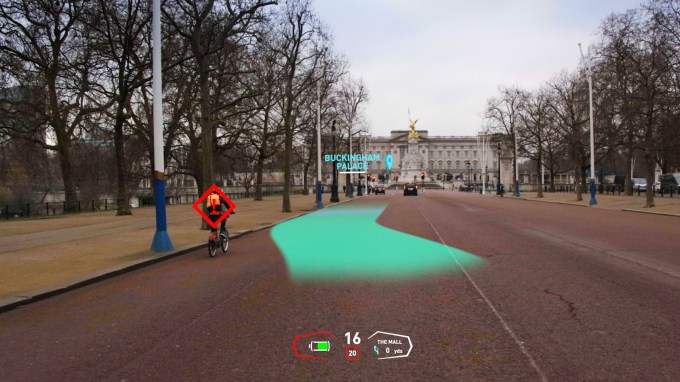The automotive industry is starting to show some signs of recovery after a big contraction during the COVID-19 pandemic, and carmakers planning for the next five years are looking at what new features might help them eek out more sales. Envisics — a U.K. startup that designs holographic in-car technology that projects navigation, safety alerts and other data on the inside of the windscreen (commonly described as heads-up display, or HUD) — is today announcing $50 million in funding, as it vies to be a part of that conversation.
The funds will be used both to carry out work with current customers on Envisics’ existing holographic technology, with customers including GM; and to continue developing the next generation of the platform, which Dr. Jamieson Christmas, the founder and CEO, says come in a smaller form factor that will make it possible to build into cars of all sizes (and price points), and with more enhanced video capabilities.
“Our next-generation technology unlocks much more of the holographic potential,” he said in an interview. “We really are on the path to delivering that Star Wars vision of the world, with [in-car] 3D volumetric experiences.”
This latest funding, which more specifically is being described as “over” $50 million, is coming from a raft of strategic backers that include Hyundai Mobis, InMotion Ventures (the investment arm of Jaguar Land Rover) and Stellantis. Envisics says it is “part of” a Series C. Even with the current clouds hanging over the market, Milton Keynes-based Envisics confirmed to us that it is still in talks with other investors to raise more.
Yet the $50 million being announced today has already driven up the valuation of Envisics to $500 million — double the $250 million valuation Envisics had in 2020, when it raised $50 million in a Series B. (That round also included Hyundai Mobis, alongside General Motors Ventures, SAIC Motors and Van Tuyl Companies — the family office of the Van Tuyl Group, which specializes in automotive dealerships and related services. All of these remain shareholders, Envisics said.)
Envisics has been carving out a solid place for itself among auto manufacturers. Christmas told us in an interview that Envisics is “working with just about everybody” at the moment, although he declined to give names beyond Jaguar Land Rover, which was the first OEM customer for Envisics’ technology; and GM, which has confirmed that its Lyriq electric Cadillacs will integrate Envisics’ second-generation displays.

But all the same, the startup is facing market challenges on two fronts. We are in an era where we have seen many automotive technology plays stall or run out of gas altogether. Be it shut downs of high-profile efforts like Argo AI, or small but promising startups like Broadmann17; or more scrutiny for those still standing like Cruise, it feels like nothing has been spared. Equally we have yet to see any great businesses built around augmented reality technology, which includes the HUD market.
Hanging over both industries is the wider economy and the impact that will have not just on more automotive sales, but consumers willing to pay a premium to load in extras like augmented reality displays into new vehicles.
Despite these hurdles, there are some promising signs, too.
The GM deal, for example, is seemingly all coming in on time. Back in 2020, Christmas said that Envisics’ first commercial products would come out in 2023, and Christmas confirmed this week that this is still the plan. The first HUDs are “remarkably, absolutely on track to be released this year,” he said.
While the Lyric will most certainly be a high-end, premium vehicle, it’s a start. The startup has also inked deals with the likes of Panasonic Automotive Systems, the major automotive supplier that is a division of the consumer electronics giant Panasonic, which points to future rollouts across a wider range of models and price points.
As for what is appearing on these HUDs, for the moment, Christmas said that the initial focus — no pun intended — is on need-to-know, rather than nice-to-know, information for the driver: safety, vehicle status and navigation alerts are priorities; alerts for new albums or podcasts dropping on Spotify are not. Overall, it’s still optimizing what the best, and safest, experience might be for drivers.
Although car makers originally thought that drivers would want screens in vehicles that were as big and pervasive as their computers, phones and TVs are today, in fact large displays have started to fall out of favor because they can become too distracting, and often not even necessary, Christmas pointed out. The same goes for HUDs and the real estate that their data would occupy on the windscreen.
Christmas described the question of how much real estate is too much as “the single biggest pain point that car companies are facing” when it comes to questions of how to build out interactive, connected experiences for drivers.
“We’re working hard, obviously, to qualify the tech,” he said. The company notes that while AR HUD is still a very small part of the overall OEM market, accounting for just 1.6 million units in 2022, it will grow to 19.1 million by 2032.
In the meantime, strategic backers see investing in Envisics now as a good way to get early access to its technology for when they are ready to deploy it.
“Hyundai Mobis is very pleased to continue our strategic partnership with Envisics to jointly develop AR-HUDs and to improve the in-car experience,” said Younghoon Han, VP and head of electronic control and convenience, Hyundai Mobis, in a statement. “Hyundai Mobis expects to provide next-generation AR-HUDs with cutting-edge holographic technology, and to deliver an intuitive, safe, and convenient HMI to global automakers by strengthening our partnership with Envisics.”































Comment